- BY patric
- POSTED IN Tips and Tricks
- WITH 0 COMMENTS
- PERMALINK
- STANDARD POST TYPE
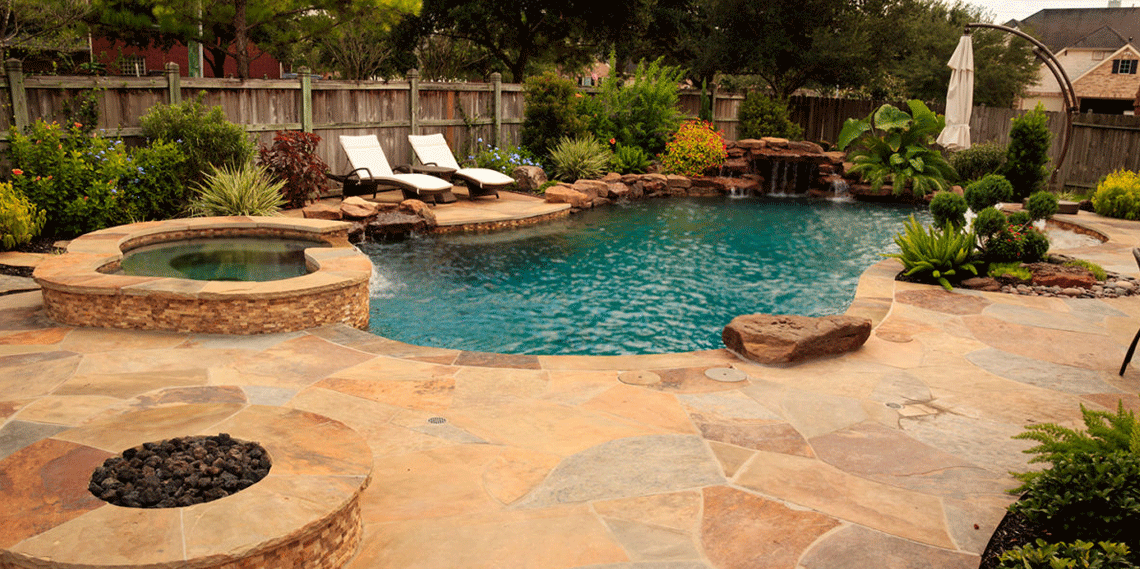
There are a variety of materials that can be used for pool decks and patio areas in Las Vegas. There are many materials to choose from, including concrete, pavers, stone, and several others. When deciding which material to use, it is important to consider the climate, your budget, and the look you want for your outdoor space. This article will outline the various options available to you and help guide you through choosing the right material for your ideal pool deck or patio.
Important Factors to Consider Before Installation
There are a few important factors you should consider before installing your new pool deck or patio area. The climate is one of the most important things to consider, as it will affect the materials you choose. If you live in an area with hot summers or cold winters, you’ll need a material that can withstand extreme temperatures. Concrete and pavers are two good options for colder climates, while stone is a better choice for warmer climates.
Your budget is another important factor to consider when choosing materials. Stone and other natural materials can be quite expensive, so if you’re working with a limited budget, concrete may be a better option for you. However, keep in mind that concrete can crack and stain over time, so it’s important to choose a high-quality concrete mix and to seal it properly.
The look you want for your outdoor space is also important to consider. If you want a rustic, natural look, stone may be the best choice for you. If you’re looking for a more modern or polished look, concrete or pavers may be a better option.
The following sections will discuss each of these materials in more detail so that you can make an informed decision about which is right for your needs.
Concrete
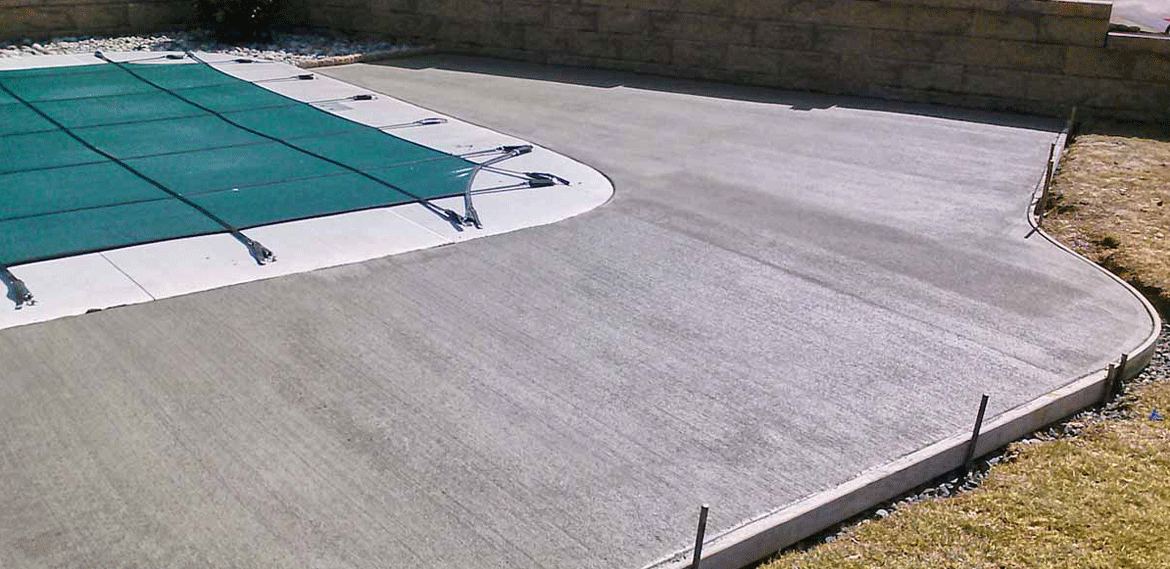
Concrete is a versatile material that can be used for pool decks, patios, and even driveways. It’s affordable, durable, and easy to install, making it a popular choice for many homeowners. However, keep in mind that concrete can crack and stain over time, so it’s important to choose a high-quality concrete mix and to seal it properly.
Concrete can be stained in a variety of colors, or you can add a stamped pattern for a more decorative look. You can also choose from a variety of finishes, including smooth, textured, or stamped.
Pros of Concrete:
- Inexpensive
- Durable
- Easy to install
Cons of Concrete:
- Can crack or stain over time, so it must be sealed for longevity
Pavers
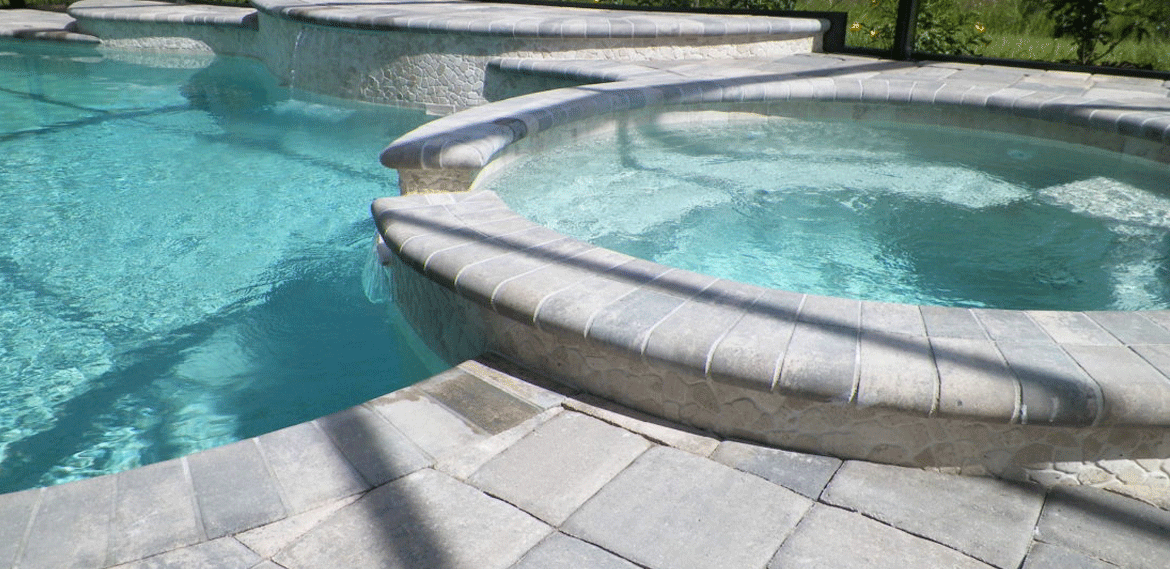
Pavers are one of the most versatile materials for pool decks and patios, as they can be used to create almost any look imaginable. Pavers come in a variety of sizes and colors, so you can choose pavers that mimic natural stone or opt for bolder designs such as multicolor or metallic-toned pavers.
When choosing pavers for your pool deck or patio area, it’s important to keep in mind the climate. Pavers are not as durable as concrete or stone, so they may not be a good choice for colder climates. However, if you live in a warmer climate like Las Vegas, pavers can be a great option because they allow for airflow and help keep your patio area cool.
Pros of Pavers:
- Wide range of color options available
- Durable
- Easy to install
Cons of Pavers:
- More expensive than concrete or stone per square foot
- Requires more maintenance compared to other materials
Stone
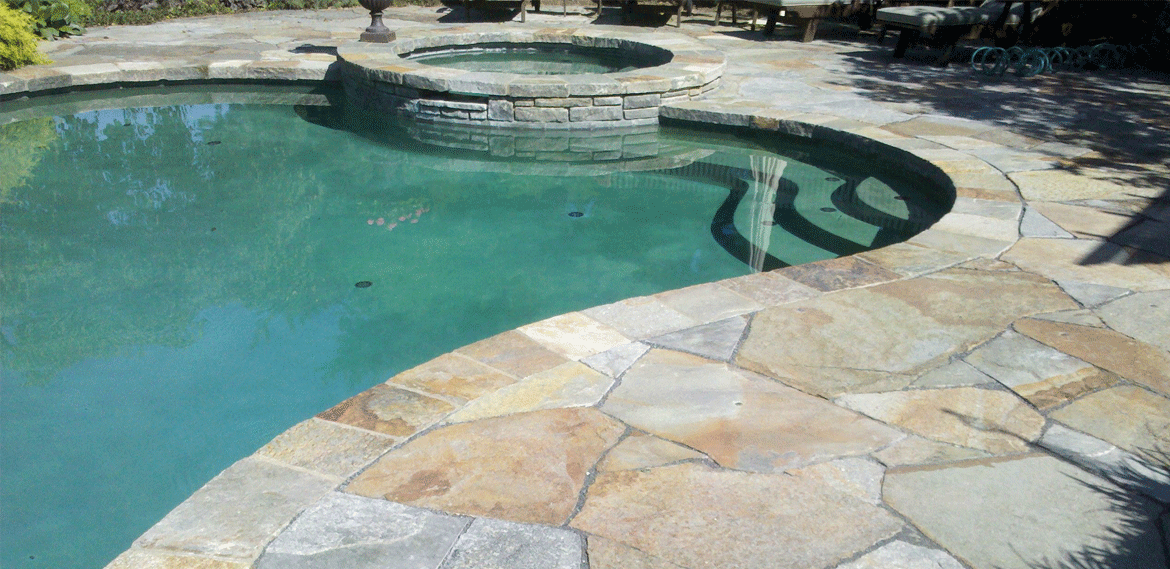
Stone is another popular choice for pool decks and patios because of its timeless look and natural beauty. Stone is a great option for those who want a rustic, natural look. Stone also offers a variety of benefits, including durability and easy installation.
When choosing a stone for your pool deck or patio area, it’s important to consider the climate you live in as well as the overall look you’re going for. Stone absorbs heat from the sun more than other materials, so it’s not recommended for warm climates unless it’s properly shaded with an umbrella or pergola. Stone may be difficult to install if you live in a colder climate but can be easier to work with if you live in a warmer climate where rocks are abundant, and soil isn’t frozen year-round.
Pros of Stone:
- Durable
- Easy to install
- Timeless, natural look
Cons of Stone:
- Absorbs heat from the sun more than other materials, so it’s not recommended for warm climates
- May be difficult to install in colder climates
- Can be expensive depending on the type of stone you choose.
Brick
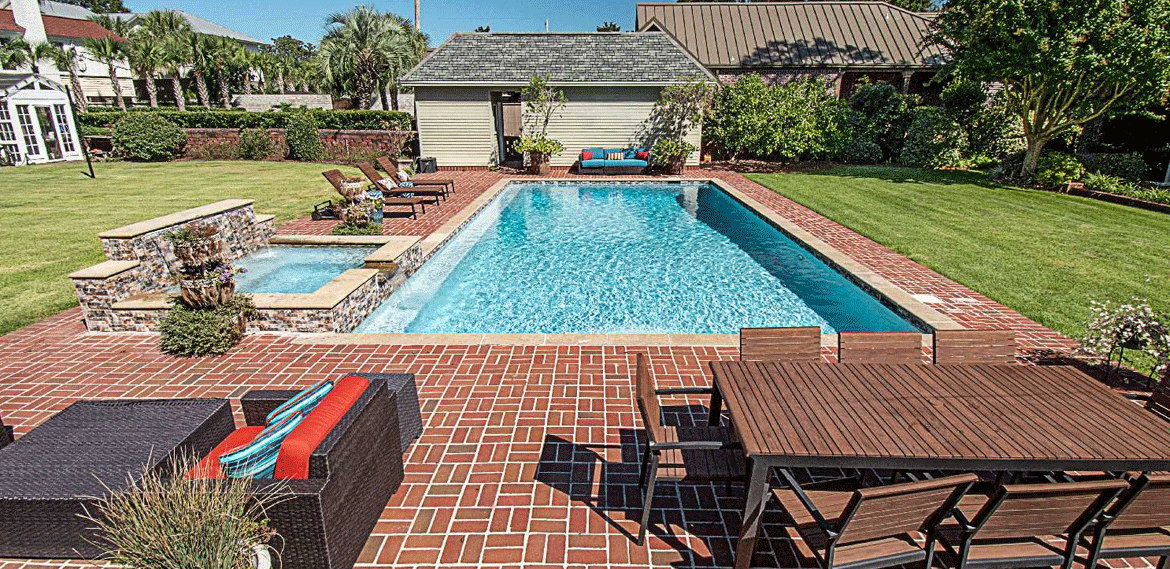
Brick is another popular choice for pool decks and patios because it offers a classic look that works well with most styles of home. Brick can be used to create unique patterns or can be laid in a traditional brick paver design.
Brick is an affordable option, but you will need to repair or replace damaged brick on your patio regularly, so keep this in mind when choosing brick for your space.
Pros of Brick:
- Diverse color options are available
- Durable if installed correctly
- Affordable
Cons of Brick:
- More expensive than concrete per square foot
- Requires more maintenance compared to other materials (especially pavers)
- Can crack more than other materials
Wood
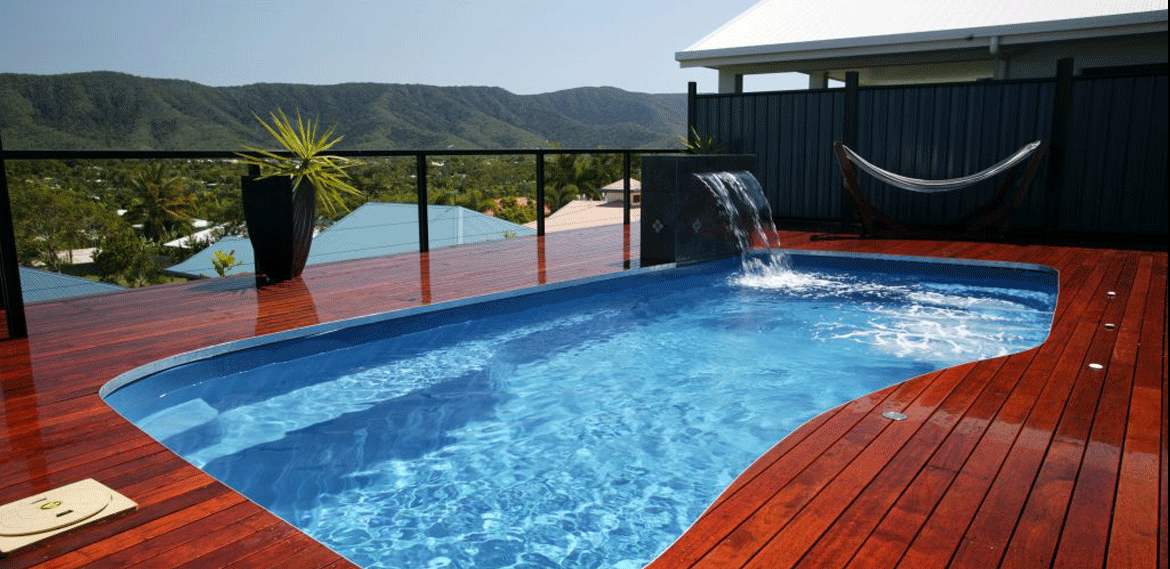
Wood offers homeowners the opportunity to create a patio area that is both traditional and rustic. Wood can be used to mimic the look of stone, brick, or even tile. However, you must choose quality wood with proper installation to ensure durability against water damage.
If you choose wood for your pool deck or patio area, it’s important to consider how much upkeep it will require compared to other materials. Wood requires regular maintenance, including resealing every few years, plus it doesn’t last as long as other materials such as concrete or pavers over time.
Pros of Wood:
- Wide range of color options are available
- Durable with proper installation
Cons of Wood:
- Wood is not as durable as other materials
- More expensive than concrete or paver per square foot
- Requires more maintenance compared to other materials (including resealing every few years)
- Can warp, rot, and crack over time.
Turf
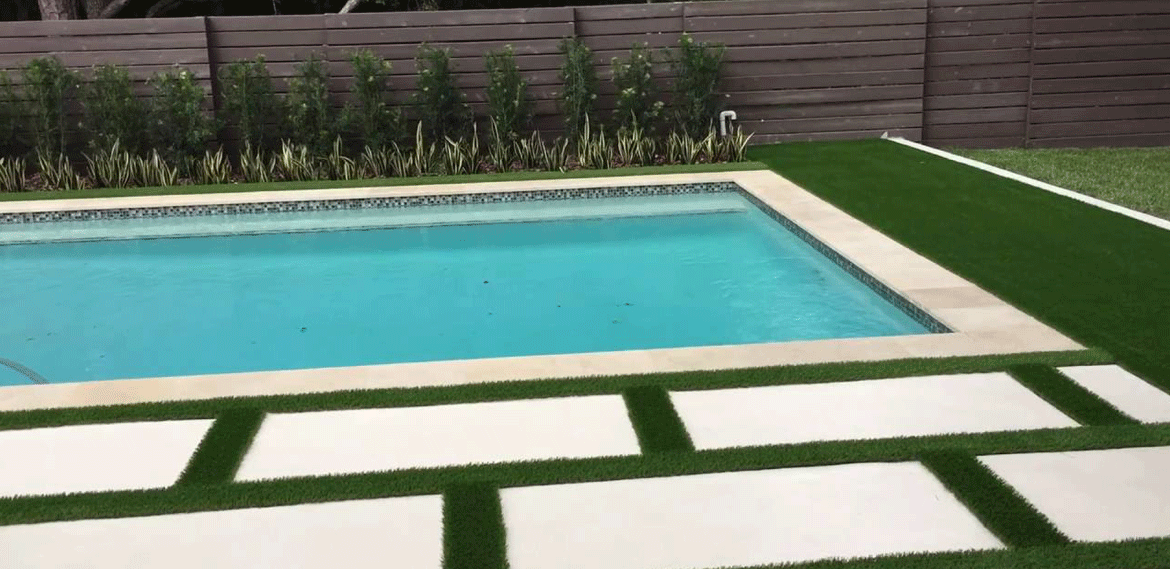
Turf is a newer option for pool decks and patios, and it is becoming increasingly popular because of its low-maintenance nature. With turf, you can create an area that looks like a natural lawn without all the hassle of mowing and watering.
Turf is not as durable as other materials, so it’s not recommended for areas that will receive a lot of traffic. However, if you have a patio area that isn’t used very often or is for aesthetic purposes only, turf may be a good option for you.
Pros of Turf:
- Low-maintenance
- Looks like natural grass
Cons of Turf:
- Can be expensive depending on the quality of turf you choose.
- May not be suitable for high-traffic areas.
Tile
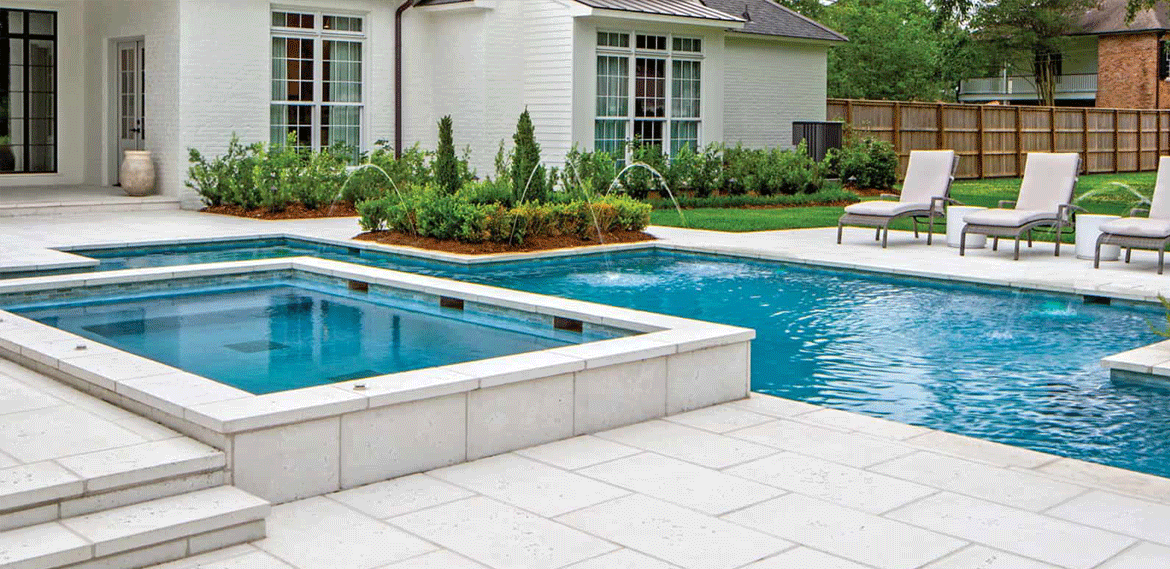
Tile is a popular choice for pool decks and patios because it’s durable, easy to clean, and comes in a variety of colors and styles. You can choose ceramic or porcelain tile, both of which are non-slip and weather-resistant.
Tile is one of the more expensive options for pool decks and patios, but it can last for decades with proper care. If you’re looking for a classic look that will never go out of style, tile may be the right choice for you.
Pros of Tile:
- Durable /span>
- Easy to clean
- Comes in a variety of colors and styles
Cons of Tile:
- Can be expensive depending on the quality of the tile you choose
- May be difficult to install in colder climates.
- Can crack if not installed correctly.
- May require more maintenance than other materials.
Synthetic Decking Materials
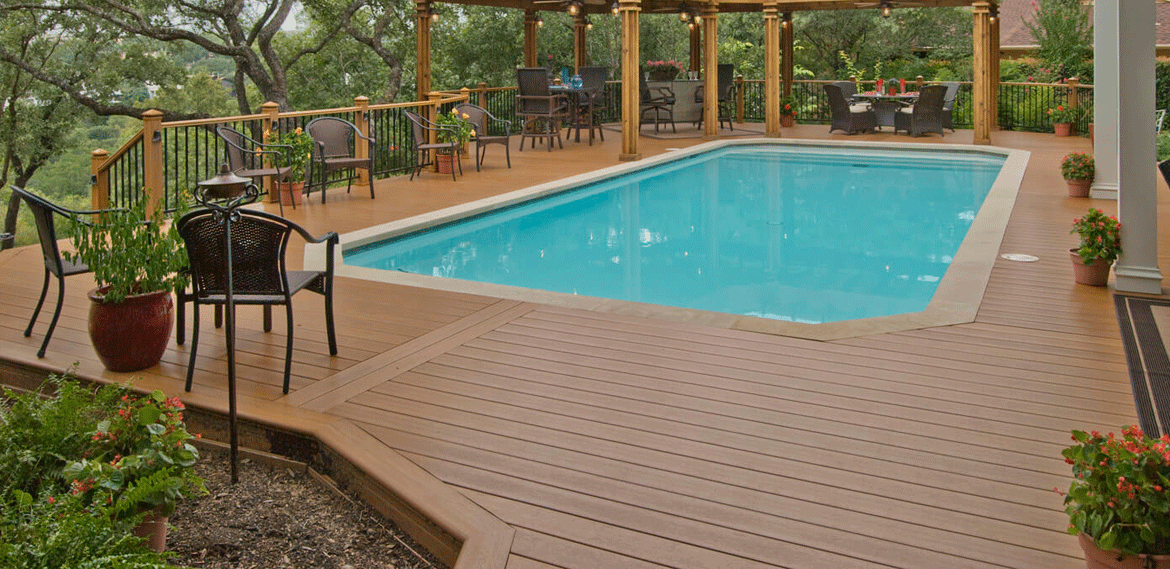
If you’re looking for a low-maintenance, affordable option for your pool deck or patio area, synthetic decking materials may be the right choice for you. Synthetic decking is made of plastic or composite materials, and it doesn’t require painting, staining, or sealing.
Synthetic decking is available in a variety of colors and styles, and it’s resistant to fading, insect damage, and moisture. However, synthetic decking can be more expensive than other options, and it may not be as durable over time.
Pros of Synthetic Decking:
- Low-maintenance
- Available in a variety of colors and styles
- Resistant to fading, insect damage, and moisture
- Can be installed quickly
Cons of Synthetic Decking:
- Less durable than other options
- May not be suitable for high-traffic areas.
- Can crack if not installed correctly.
- May require upkeep similar to wood (i.e., resealing)
Mixed Materials
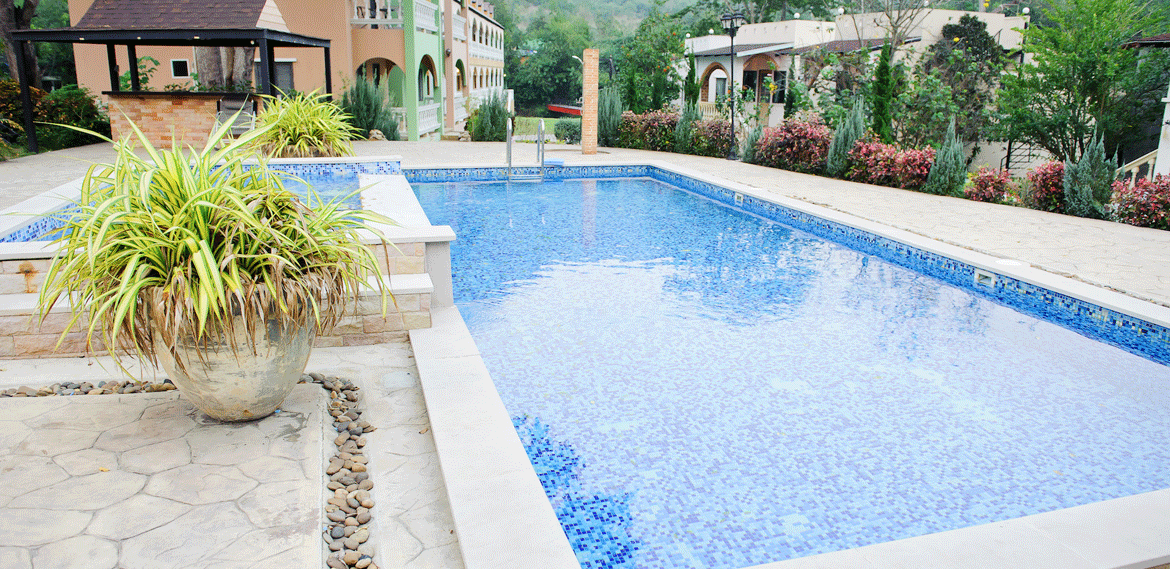
If you want the look of natural materials but don’t want the hassle of regular maintenance, you can choose a mix of materials for your pool deck or patio area. For example, you can combine wood with brick, stone, or tile to create a unique look that will never go out of style.
This option is also a good choice if you’re working with a limited budget because it allows you to choose more affordable materials than if you used them separately. However, keep in mind that mixed materials may not be as durable as other options.
Pros of Mixed Materials:
- Affordable
- Unique look that will never go out of style
- More durable than synthetic decking
Cons of Mixed Materials:
- May not be as durable as other options
- More difficult to install than synthetic decking.
- May require more maintenance than synthetic decking.
In the end, the best material for your pool deck or patio area will depend on your individual needs and budget. Talk to one of our professionals about your options and get help choosing the material that is right for you.

